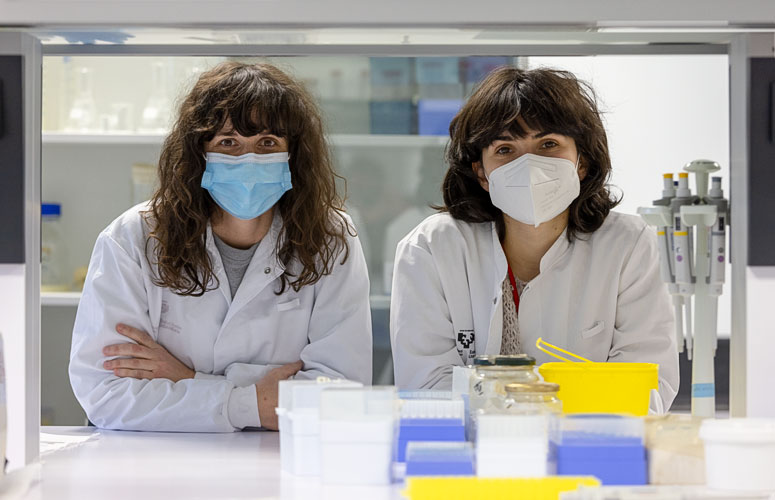The Department of Genetics, Physical Anthropology and Animal Physiology at the UPV/EHU has explored the development of intestinal inflammation in coeliac disease. The study reports for the first time that gluten modifies RNA molecules; this influences the quantity of different proteins and thus increases intestinal inflammation. The discovery has enabled them to propose new alternatives for treating coeliac disease and other intestinal inflammatory disorders.
A UPV/EHU group reports that gluten may modify RNA
A study by the UPV/EHU-University of the Basque Country puts forward possible alternatives for treating coeliac disease and other intestinal inflammatory disorders
- Research
First publication date: 16/03/2021

Coeliac disease is a complex, autoimmune disorder that affects genetically susceptible individuals. Gluten in the diet unleashes an immune response, and to combat it the only available treatment until now has been to follow a strict, lifelong, gluten-free diet. It is not at all easy for patients to follow this diet, because it greatly restricts their life quality. The difficulties in following such a strict diet may increase the risk of developing complications, such as gastrointestinal cancer, so other treatments to combat this disorder need to be found. Even though it has been proven that certain genes are linked to genetic susceptibility to coeliac disease, their role in the pathogenesis of the disease remains unknown, and this hampers the development of treatments.
A group in the Department of Genetics, Physical Anthropology and Animal Physiology at the UPV/EHU is conducting research into the development of intestinal inflammation in coeliac disease and in cases of gluten intolerance. As the Ikerbasque researcher Ainara Castellanos-Rubio explains, significant results have been achieved in the research: “Firstly, we reported for the first time that gluten modifies RNA molecules. These modifications in the RNA may be related to the development of diseases. Specifically, we saw that gluten consumption by cells, mice and human beings may modify the RNA (messenger RNA) of the XPO1 gene, which results in an increase in the production of XPO1 proteins and in an increase in intestinal inflammation. Furthermore, a genetic variant included in the XPO1 gene impacts on this modification of the RNA and increases the risk of intestinal inflammation developing in individuals with a risk variable.”
New research opportunities
The study has been published in the journal Gut, one of the most important journals worldwide on gastroenterology and hepatology and which publishes top-level clinical research. As explained in the article, this research proposes new alternatives designed to treat coeliac disease and other inflammatory intestinal diseases. “Our research has described new therapeutic targets (such as XPO1 and the proteins involved in the modification of RNA), and has opened up the possibility of developing new therapeutic approaches to treat coeliac disease. Right now, we are evaluating different molecules that target these proteins and some are already being used to treat other intestinal diseases,” explained Castellanos-Rubio.
Furthermore, and with more basic science in mind, the description of the modification that gluten may trigger in the RNA “is opening up new doors for research, as we have seen that external agents (such as dietary gluten, in this case) may modify our RNA and give rise to an inflammatory response”, she asserted. In this respect and with a more distant future in mind, the researcher concluded: “By adapting our diet or using dietary agents we will be capable of modifying RNA one way or another, and thus slowing down or preventing the development of certain diseases."
Additional information
The senior author of the study is Ainara Castellanos-Rubio, an Ikerbasque researcher in the Department of Genetics, Physical Anthropology and Animal Physiology at the UPV/EHU, and Ane Olazagoitia-Garmendia, who is writing up her thesis at the UPV/EHU, has participated as lead author. The work was the outcome of the relationship between international research groups at Columbia University and the University of Chicago (USA), the McMaster University of Canada, the University of Barcelona, Galdakao and Cruces hospitals, Biocruces and the UPV/EHU.
Bibliographic reference
- Gluten-induced RNA methylation changes regulate intestinal inflammation via allele-specific XPO1 translation in epithelial cells
- Gut
- DOI: 10.1136/gutjnl-2020-322566



